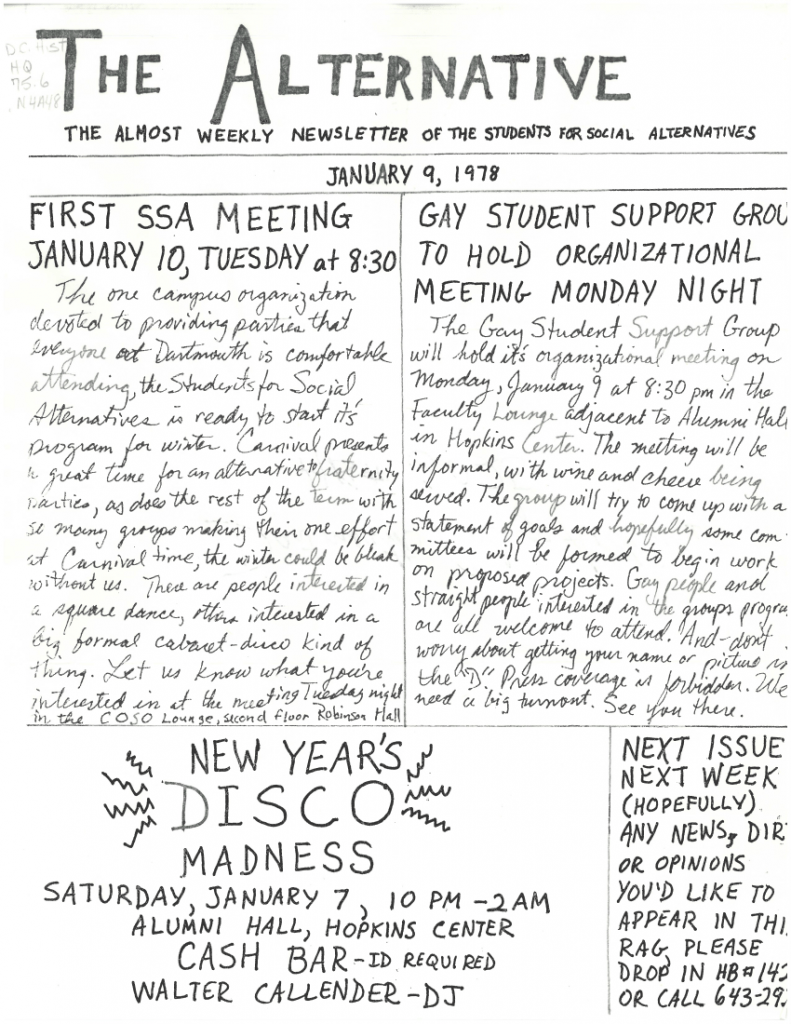Founded: Spring 19761
Recognized by COSO: Fall 19762
Inactive: Starting 1978-793
Contents
Background
Bill Monsour ’77 and some of his friends began the Students for Social Alternatives in his junior year.4 In 1976, a brochure by the SSA stated the need for social environments where “women, blacks, homosexuals, vegetarians, or any other distinct group” could feel understood.5 Monsour and the others were responding to the recent shifts they had perceived in the campus demographics, where the student body was becoming more racially diverse, women had only started attending four years before, and as many members knew from personal experience, gay students were also looking for social spaces.6
The Dean of the Tucker Foundation, Warner Traynham, provided the leaders of the SSA with the “emotional and financial assistance” they needed to get it started.7 After Monsour left Dartmouth in 1977, Traynham wrote to him to update him on what was happening on campus:
We here are embroiled in preparations for the new student enter. The SSA continues, haltingly, but it continues. Stu [Lewan] is keeping things afloat. He’s got a lot of energy. Your efforts have had a real impact on this campus for all the problems it entailed and Stu’s done a job picking up the ball.8
Despite Monsour’s initial efforts and Lewan’s energy, the SSA only continued for about one more year, when it gave way to form Dartmouth’s first Gay Student Support Group.
Activities

Aside from social events, the SSA brought up other campus issues. One issue of The Alternative boasts the headlines “Counseling: Let’s Make Some Changes” and “Alternative Housing: Trustees Promise Study.”15 The latter referred to a petition the SSA had circulated and presented to Trustee Robert Kilmarx at an open meeting of the Committee on Student Affairs, which asked for “alternatives to typical dorm and frat living.”16
Gay Associations
Bill Monsour said that he originally intended for the SSA to cater to the “guys and women who showed up at the college not knowing what they were getting into; not realizing, not fitting in,”17 but other members saw that as only part of the story. One member, Roger Klorese, saw it as “in a sense…a front group for a gay student group….A large number of us were speaking as people who felt themselves directly disenfranchised by [the fraternity system] as gay men and lesbians.”18 Lewan later admitted that the SSA’s cooperation with the Afro-American Society and Women at Dartmouth served as “a smokescreen” which prevented social events from being “defined as exclusively gay.”19 So to a certain degree, the fact that the SSA drew in so many gay members was not an accident, with some members intentionally using the group as a pretense to gather with other gay students.
Notes
- Allen A. Drexel, “Degrees of Broken Silence: Dartmouth Man, Gay Men, and Women, 1935-1991,” Honors thesis, Dartmouth College, 1991, 54, D.C. History LD1441.D74 1991, Rauner Special Collections Library. ↩
- Bruce Cooper. Bruce Cooper to Frank Smallwood, November 10, 1976, DA-8, Box 2604, Council on Student Organizations, Rauner Special Collections Library. ↩
- Council on Student Organizations, “Annual Report: 1978-79,” November 9, 1979, 1, 6, DA-8, Box 2626, Council on Student Organizations, 01/01/1979-12/31/1980, Rauner Special Collections Library. ↩
- Drexel, “Degrees of Broken Silence, 54. ↩
- Drexel, 55. ↩
- Stuart M. Lewan, interview by Abigail R. Mihaly, transcript and audio, SpeakOut, May 22, 2018, https://exhibits.library.dartmouth.edu/s/SpeakOut/item/196. ↩
- Drexel, 54. ↩
- Warner Traynham, Warner Traynham to Bill Monsour, December 13, 1977, DA-114, Box 3702, December 1977, Rauner Special Collections Library. ↩
- The Alternative, January 9, 1978, D.C. History HQ75.6N4 A48, Rauner Special Collections Library. ↩
- Lewan, SpeakOut interview. ↩
- “Another Disco?” The Alternative, January 26, 1978, D.C. History HQ75.6N4 A48, Rauner Special Collections Library. ↩
- Sue Goodman Cohen, interview by Mary Donin, transcript, April 5, 2013, https://www.dartmouth.edu/~library/rauner/archives/oral_history/community/transcripts/Cohen_SueGoodman_Interview.pdf. ↩
- Drexel, 57. ↩
- Drexel, 56. ↩
- The Alternative, January 26, 1978. ↩
- The Alternative, January 26, 1978. ↩
- Drexel, 54-55. ↩
- Drexel, 55. ↩
- Drexel, 56. ↩